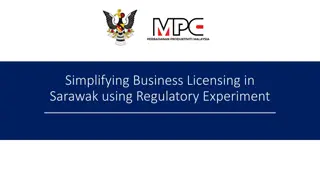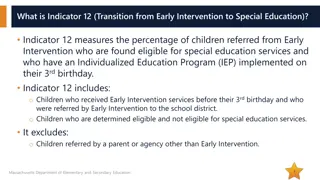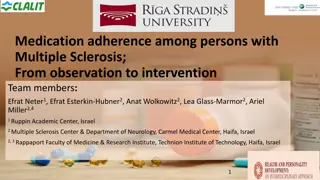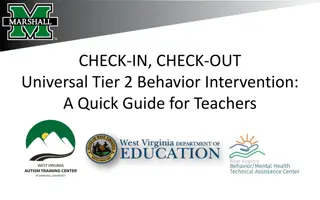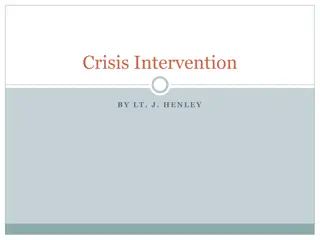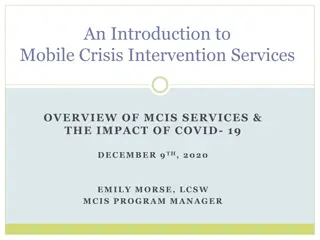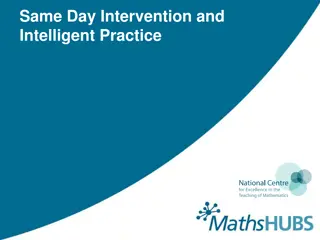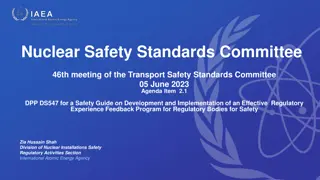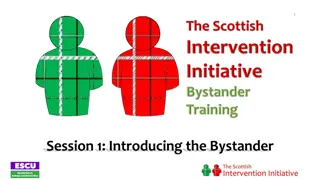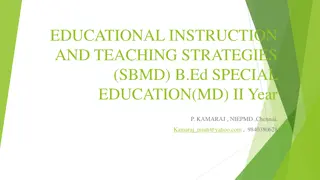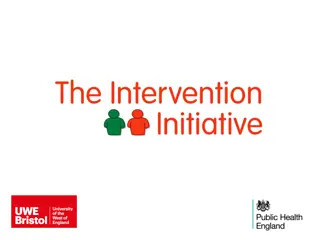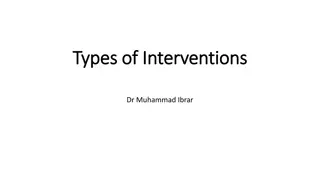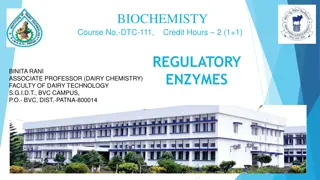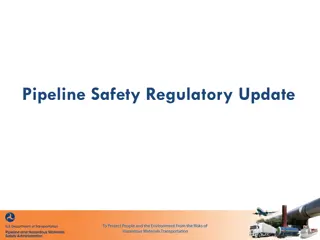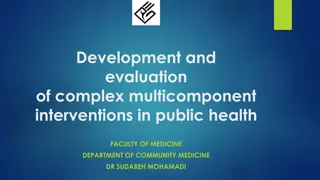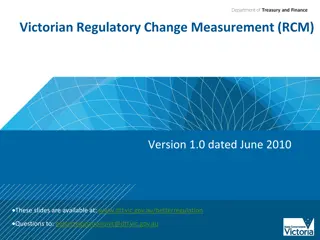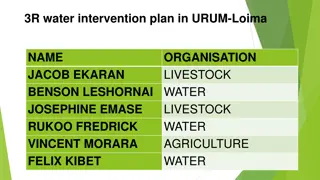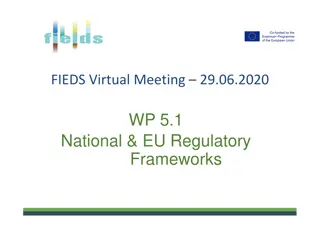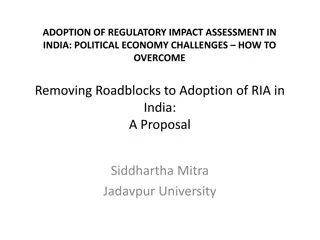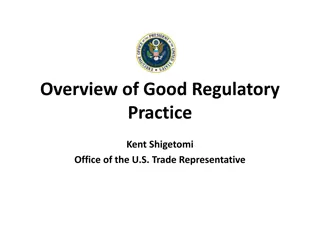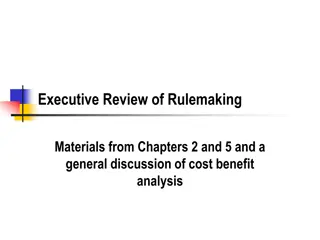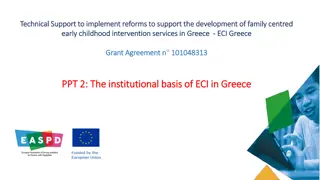Mindfulness-Based Intervention for Adolescents with Chronic Migraine: Qualitative Study
This study focuses on developing a mindfulness-based intervention for adolescents with chronic migraine, aiming to address the lack of effective treatments. Through remote interviews and qualitative analysis, stakeholders' experiences and feedback are being gathered to adapt the intervention. The re
0 views • 15 slides
Streamlining Business Licensing in Sarawak through Regulatory Experimentation
This initiative in Sarawak focuses on simplifying the business licensing process through regulatory experiments aimed at reducing regulatory burdens and improving the overall business ecosystem. By implementing innovative strategies such as risk-based approvals and composite licenses, the goal is to
0 views • 7 slides
Social Network-Based Intervention Improves HIV Testing and Linkage Among Fishermen in Kenya
In sub-Saharan Africa, a study was conducted among Lake Victoria fishermen in Kenya to assess the effectiveness of a social network-based intervention in improving HIV testing and linkage outcomes. Results showed significantly higher rates of HIV self-testing and linkage to health facilities in the
0 views • 19 slides
Regulatory Update Highlights and Priorities for ONR NGO Forum 2023
The Regulatory Update presented by Mark Foy, Chief Executive, and Chief Nuclear Inspector at the ONR NGO Forum highlighted key areas of focus including ethics, future strategies, and regulatory advancements in the nuclear industry. The forum also featured insights from Donald Urquhart, Executive Dir
3 views • 26 slides
Complex SFA CTO Intervention Live Case Study - 11/29/2023
A 72-year-old gentleman with severe RLE claudication referred for evaluation. Despite medical therapy, he experiences rest pain. Past medical history includes diabetes, hypertension, hyperlipidemia, hypothyroidism, and prior PAD intervention. The case details the patient's presentation, vital signs,
1 views • 5 slides
Understanding Indicator 12: Transition from Early Intervention to Special Education
Indicator 12 measures the successful transition of children from Early Intervention to Special Education by evaluating the percentage of children referred from Early Intervention who are found eligible for special education services and have an Individualized Education Program (IEP) in place by thei
1 views • 6 slides
Routines-Based Intervention for Early Childhood Home Visiting
Learn about the Routines-Based Intervention for Early Childhood Home Visiting by Robin McWilliam from the Evidence-based International Early Intervention Office. Explore how children learn, service decision-making, support provision, and evaluation. Understand the importance of needs assessment, eng
0 views • 34 slides
Enhancing Medication Adherence in Multiple Sclerosis Patients
This study explores medication adherence among individuals with Multiple Sclerosis (MS), presenting insights from observation to intervention stages. It delves into the background of MS, adherence, Disease-Modifying Therapies (DMTs), and the challenges faced. The team identifies reasons for non-adhe
0 views • 41 slides
Comprehensive Guide to Check-In, Check-Out Universal Tier 2 Behavior Intervention for Teachers
Explore the Check-In, Check-Out Universal Tier 2 Behavior Intervention designed to provide structure, accountability, and feedback to students, improving behavior and academic success. Discover how it creates a strong home-school connection and is tailored for students not meeting Tier 1 expectation
0 views • 18 slides
Understanding Crisis Intervention and CIT in Corrections
Explore the concept of crisis intervention, the history of Crisis Intervention Teams (CIT), and the application of CIT principles in prison settings. Learn about the nature of crises, symptoms, and stages, with a focus on referring inmates to mental health services and enhancing safety within correc
2 views • 23 slides
Overview of Mobile Crisis Intervention Services and the Impact of COVID-19
Mobile Crisis Intervention Services (MCIS) in Connecticut provides crisis stabilization and hospital diversion for youth experiencing behavioral and mental health crises. Available for ages 0-17 and 18-year-olds in high school, MCIS offers intervention, referrals, and support to prevent future crise
0 views • 17 slides
Enhancing Learning Through Same-Day Intervention and Intelligent Practice
Efforts are made to ensure students keep up with lessons through same-day intervention, providing support for those who require additional assistance. Intelligent practice methods are employed to reinforce learning, engaging students in reasoning activities. Various models of same-day intervention a
0 views • 7 slides
Developing an Effective Regulatory Experience Feedback Program for Safety: A Guide for Regulatory Bodies
This Safety Guide aims to assist regulatory bodies in managing regulatory experience by identifying sources, establishing means for information exchange, and implementing record-keeping processes. It addresses the need for cooperation and knowledge sharing among regulatory bodies to enhance safety s
1 views • 9 slides
Understanding Bystander Intervention in Sensitive Situations
Learn about the role of a bystander in sensitive situations, including types of bystanders and how to intervene effectively. Explore scenarios and factors affecting intervention and non-intervention, emphasizing the importance of noticing, interpreting, feeling responsible, and possessing necessary
1 views • 20 slides
Early Intervention and Teaching Strategies in Special Education
Early Intervention in Special Education involves promoting the development of children with delays or disabilities through a system of services focusing on various skills like language, cognition, and social interaction. Understanding brain plasticity, gene-environment interaction, and the importanc
1 views • 19 slides
Clear Criteria for Assessing Regulatory-Grade Real-World Data Sources
The discussion at the ISPOR Annual Meeting focused on defining regulatory-grade real-world data (RWD) sources as those of adequate quality for specific regulatory purposes. Panelists emphasized the importance of authenticity, transparency, accuracy, and track record in evaluating data quality. They
2 views • 5 slides
Intervention Boosting Self-Efficacy Among Adolescents Challenging Discrimination
Adolescents challenging discrimination through a perspective-taking and action-planning intervention showed increased self-efficacy, particularly among White participants. The intervention, which included facilitated discussion sessions, led to positive outcomes and highlighted the importance of bys
0 views • 7 slides
Boosting Self-Efficacy in Adolescents: Intervention Study
Adolescents challenged discrimination through a perspective-taking and action-planning intervention, leading to increased self-efficacy, especially among White participants. The intervention involved facilitated discussions, self-disclosure, and sharing experiences to empower adolescents to interven
0 views • 7 slides
Understanding the Regulatory Environment: A Comprehensive Overview
This session delves into the regulatory landscape focusing on the objectives, types, and origins of regulations in the financial sector, particularly in Nigeria. It discusses the essential role of regulation in promoting compliance, protecting stakeholders, and maintaining operational integrity with
1 views • 42 slides
Effective Intervention Planning for Rehabilitation Services
The intervention in the DEA programme involves a thorough assessment of user needs, formulation of objectives, and planning based on case management technology. The cycle includes assessment, planning, and actual intervention. Prioritizing high-priority problems is essential for effective outcomes.
1 views • 13 slides
Law Enforcement's Response to Mental Health Crisis Intervention
Law enforcement agencies have established Emotionally Disturbed Persons Response Teams (EDPRT) and Crisis Intervention Teams (CIT) to address mental health crises in the community. These specially trained officers handle situations involving emotionally disturbed individuals, suicidal persons, psych
0 views • 13 slides
Understanding Bystander Intervention in Social Norms Discussion
Explore the dynamics of bystander intervention in social norms discussions, highlighting the importance of noticing, interpreting, feeling responsible, and possessing necessary skills to act. Learn through real-life scenarios and discussion questions to understand when and how intervention can occur
1 views • 19 slides
Different Types of Interventions to Address Addiction Challenges
Every individual's addiction story is unique, requiring different types of interventions tailored to their specific needs. This article explores four popular intervention approaches - simple intervention, classical intervention, family system intervention, and crisis intervention - each designed to
1 views • 7 slides
Understanding Regulatory Enzymes in Biochemical Pathways
Regulatory enzymes play a crucial role in controlling the activity of biochemical pathways by responding to the presence of specific molecules. They regulate the pathway's activity, ensuring that products are produced in the required amounts at different times. This article delves into the significa
5 views • 22 slides
Evolution of Early Childhood Intervention in Hungary
Early childhood intervention in Hungary has evolved from an emphasis on early childhood education towards an interdisciplinary, family-focused approach. The sectors involved include healthcare, education, welfare, and family affairs. A wide range of professionals, including health visitors, physicia
0 views • 10 slides
Overview of Pipeline Safety Regulatory Updates
The Protecting our Infrastructure of Pipelines and Enhancing Safety Act of 2016 authorizes funding for PHMSA. Information on rulemakings can be found in DOT reports. The timeline for future rulemaking is pending on implementing Executive Orders. Enforcing the Regulatory Reform Agenda aims to allevia
1 views • 79 slides
Development and Evaluation of Complex Multicomponent Interventions in Public Health
A key concern in public health initiatives is the lack of emphasis on evaluation during implementation. Rushed introductions of new initiatives without adequate development lead to replacements before effectiveness is determined. Collaborative efforts between researchers and practitioners are crucia
0 views • 84 slides
Overview of FDA Office of Regulatory Affairs (ORA) and Office of Regulatory Science (ORS)
This information provides insights into the organizational structure and functions of the FDA Office of Regulatory Affairs (ORA) and the Office of Regulatory Science (ORS). It includes organizational charts, details about ORA laboratory locations, and the local structure of an ORA laboratory. Additi
1 views • 31 slides
Effectiveness of Psychological Intervention in Managing Stress and Depression Among Cancer Patients
A study was conducted to assess the effectiveness of a psychological intervention program in managing stress, depression, and subjective well-being among cancer patients. The study involved 132 cancer patients aged 35 to 65 years, with 72 patients in the experimental group receiving psychological in
1 views • 48 slides
Case Study: Successful Treatment of LAD Calcified Lesion with Percutaneous Coronary Intervention
A case study dated 2024/01/06 from Far Eastern Memorial Hospital involving the treatment of a calcified lesion in the LAD artery using percutaneous coronary intervention. The procedure included wire and sheath insertion, angiography, OCT imaging revealing severe calcification, rotablation, IVL, sten
0 views • 7 slides
Mitigation of Regulatory Capture in Economic Regulation
Regulation aims to correct market failures for societal welfare, but regulatory capture by interest groups can hinder regulatory actions. This work discusses economic theories on regulatory capture, forms of capture, and strategies to mitigate risks, emphasizing the public interest theory as a promo
0 views • 29 slides
Challenges and Considerations in Regulatory Cooperation and Competition
Protecting consumers and investors through effective regulation of accounting and corporate financial reporting is crucial. Regulatory cooperation offers benefits like simplifying the regulatory environment and enforcing best practices. However, regulatory competition can uncover limits and the adva
1 views • 39 slides
Understanding the Victorian Regulatory Change Measurement (RCM)
The Victorian Regulatory Change Measurement (RCM) methodology introduced in June 2010 aims to measure reductions in regulatory burden through different categories such as administrative costs, substantive compliance costs, delay costs, and more. The RCM formula helps in calculating the total regulat
0 views • 63 slides
Water Intervention Plan in Urum-Loima Region
This water intervention plan in the Urum-Loima region focuses on addressing water gaps and potential zones for groundwater exploration. It includes related interventions such as open water storage and sand dams to meet current and future water demands for domestic, livestock, and agricultural use. T
0 views • 9 slides
National and EU Regulatory Frameworks for Training and Innovation Opportunities
Start/end date for WP5.1 initiative is M7-M24, led by CONFAGRI.PT and partners. The project aims to prepare the roll-out of deliverables at national and regional levels, focusing on regulatory frameworks, sustainability plan, and stakeholder engagement. Various organizations contribute to provide EU
0 views • 7 slides
Challenges and Solutions in Implementing Regulatory Impact Assessment in India
This article explores the adoption of Regulatory Impact Assessment (RIA) in India, discussing the political economy challenges and strategies to overcome roadblocks. It outlines the working definition of RIA, addresses potential opposition from politicians and bureaucrats, and suggests ways to gener
0 views • 7 slides
Understanding Good Regulatory Practice in Trade Governance
Good Regulatory Practice (GRP) is a key aspect of regulatory policy that focuses on improving the quality and cost-effectiveness of domestic regulations. It involves internationally recognized processes such as impact assessment, regulatory transparency, participation, and accountability. The import
0 views • 22 slides
Comprehensive Analysis of Rulemaking in Regulatory Governance
The executive review delves into regulatory materials from various chapters, highlighting both successes and failures within the regulatory landscape. It explores the tension in rulemaking, public perception of risk, and the role of non-agency regulation in tort and compensation law. The discussion
0 views • 44 slides
Understanding Captive Insurance: Regulatory Challenges and Framework
Federal agencies express systemic concerns over captive transactions, emphasizing the importance of distinguishing between different types of captives. The NAIC Solvency Framework aims to establish a consistent baseline for accounting practices in the insurance industry while allowing for flexibilit
0 views • 14 slides
Supporting Family-Centered Early Childhood Intervention Services in Greece
The grant agreement aims to implement reforms supporting the development of family-centered early childhood intervention services in Greece. It emphasizes the human rights and child rights framework, highlighting the legal and political basis of early childhood intervention in the country. The conte
0 views • 7 slides

